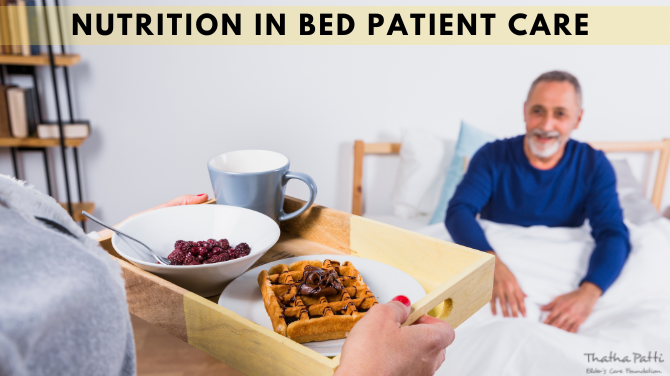- March 15, 2023
- Bedridden patients care
The Role of Nutrition in Bed Patient Care

Bedridden patients require proper nutrition to maintain their health, prevent complications, and promote healing.
Providing adequate nutrition is essential to support the patient’s immune system, maintain their muscle mass and bone density, and prevent malnutrition. Here are some important aspects of nutrition to consider when providing bedside care for bedridden patients:
-
Consult with a Healthcare Professional: It is essential to consult with a healthcare professional, such as a registered dietitian, to determine the patient’s nutritional needs. The healthcare professional will take into account the patient’s age, weight, medical conditions, and medications to develop an appropriate nutrition plan.
-
Provide a Balanced Diet: Bedridden patients require a balanced diet that includes protein, carbohydrates, fats, vitamins, and minerals. Protein is especially important for maintaining muscle mass, and it is recommended that bedridden patients consume 1.2-1.5 grams of protein per kilogram of body weight per day.
-
Offer Small, Frequent Meals: Bedridden patients may have a reduced appetite and may experience difficulty eating large meals. Offer small, frequent meals and snacks throughout the day to ensure that the patient is getting adequate nutrition.
-
Offer a Variety of Foods: Offer a variety of foods to prevent boredom and ensure that the patient is getting a balanced diet. Include fruits, vegetables, whole grains, lean proteins, and healthy fats.
-
Ensure Adequate Hydration: Bedridden patients may have difficulty drinking enough fluids, which can lead to dehydration. Offer fluids throughout the day and encourage the patient to drink water, juices, and other fluids.
-
Use Assistive Devices: Bedridden patients may require assistive devices, such as feeding tubes, to receive adequate nutrition. Consult with a healthcare professional to determine the appropriate type of feeding tube and feeding schedule.
-
Monitor Weight and Nutritional Status: Monitor the patient’s weight and nutritional status regularly to ensure that they are getting adequate nutrition. Report any significant changes to the healthcare team.
Proper nutrition is essential for the health and well-being of bedridden patients. By providing a balanced diet, small frequent meals, and adequate hydration, you can ensure that your loved one is getting the nutrition they need to maintain their health and promote healing. Consult with a healthcare professional to determine the appropriate nutrition plan for your loved one.





